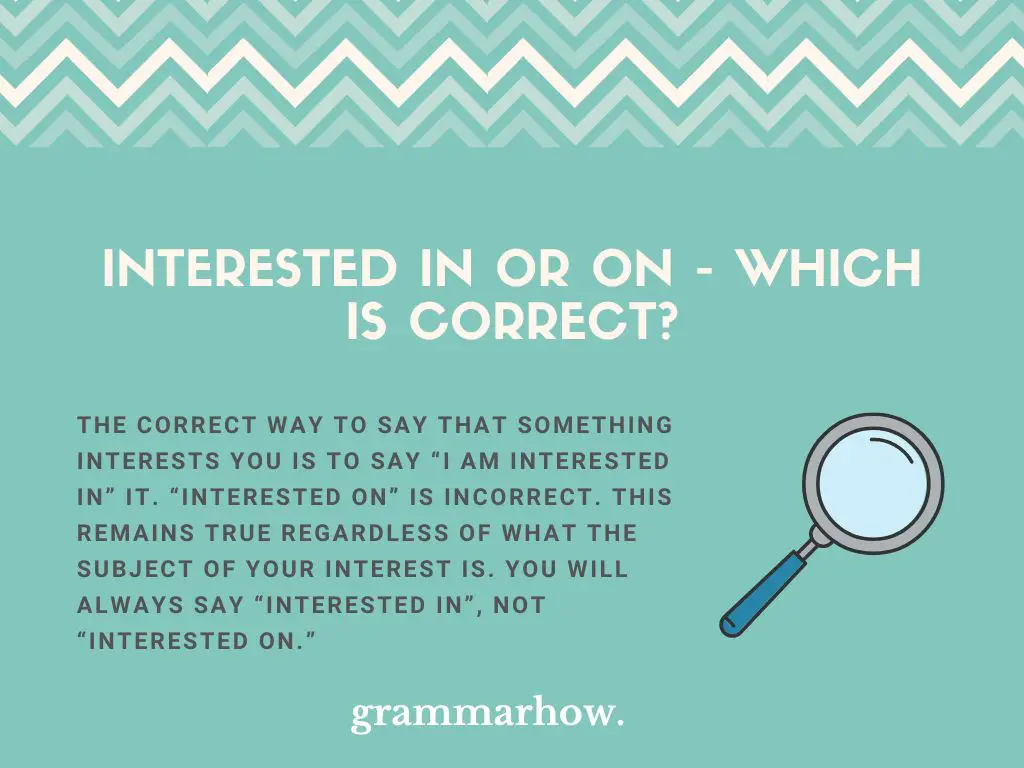If something is of interest to you, should you say that you are interested “in” it or “on” it? In this post, we will discuss which of these options is correct and why.
Interested In or On – Which Is Correct?
The correct way to say that something interests you is to say “I am interested in” it. “Interested on” is incorrect. This remains true regardless of what the subject of your interest is. You will always say “interested in”, not “interested on.”

Prepositions are a source of confusion for many people. The difference between “on” and “in” can seem so minor that it’s hard for many people to see what the difference is at all. Here’s why “interested in” is correct while “interested on” is not.
In this case, the preposition “in” indicates metaphorical location or time. In the case of “interested in”, it indicates that you are “inside” a state of interest. Look at it like this: would you say that you are “on a state of panic” or “in a state of panic?”
When saying “I am interested in”, what you are really saying is “I am in a state of interest”. It would not make any sense to say “I am on a state of interest”. That’s why saying “interested on” is always wrong.
Consider the following examples:
- I’m interested in the job you are offering.
- John is interested in doing something exciting during his summer break.
In these sentences, you are saying that someone is “in a state of interest” regarding a particular thing. In this case, that thing is either a job or doing something exciting during summer break. Because you cannot be “on a state of interest”, you should always say “interested in”.
Interested In
“Interested in” is basically a shorter, more casual way of saying “in a state of interest”. This is what you are actually saying when you claim to be “interested in” something. You are “inside” of a metaphorical state of interest. This is why “interested in” is the correct way to signify interest in a subject.
Let’s consider the following examples:
- Bailey asked me if I’m interested in someone, but I was too embarrassed to give an answer.
- If you’re interested in him, you should ask him out instead of staring at his back.
- I’m interested in learning more about the deal you’re offering.
- Would you be interested in buying a new car?
- She seems interested in the way her cat is behaving.
In all of these sentences, you could replace “interested in” with “in a state of interest” with just a slight bit of tweaking and get a logical, grammatically correct sentence. This is why “interested in” is the correct phrasing and preposition to use.
Interested On
“Interested on” is wrong. There is no time when you would say this and be grammatically correct. That’s because “on” is the wrong preposition to use here. “On” refers to either physically being on top of something, or doing an action to something.
Obviously, your interest is not physically on top of a subject. Nor are you “doing interest” to a subject. Therefore, “interested on” is incorrect and should not be used. As mentioned previously, you are “in” a state of interest. You cannot be “on” a metaphorical state of mind.
Consider these examples:
- Incorrect: Penelope is interested on learning the history of her people.
- Incorrect: Are you interested on hearing about what happened to me yesterday?
- Incorrect: Being interested on the science behind flatulence is kind of weird, Greg.
In all of these sentences, if you replaced “interested on” with “on a state of interest”, even with the necessary adjustments to sentence structure, they still wouldn’t make sense.
Conclusion
What you need to remember is quite simple: “interested on” is always wrong, period. “interested in” is correct, because you are saying that you are “in a state of interest” regarding something. “Interested in” will always be right, and “interested on” will always be wrong. It’s that simple.

Martin holds a Master’s degree in Finance and International Business. He has six years of experience in professional communication with clients, executives, and colleagues. Furthermore, he has teaching experience from Aarhus University. Martin has been featured as an expert in communication and teaching on Forbes and Shopify. Read more about Martin here.
